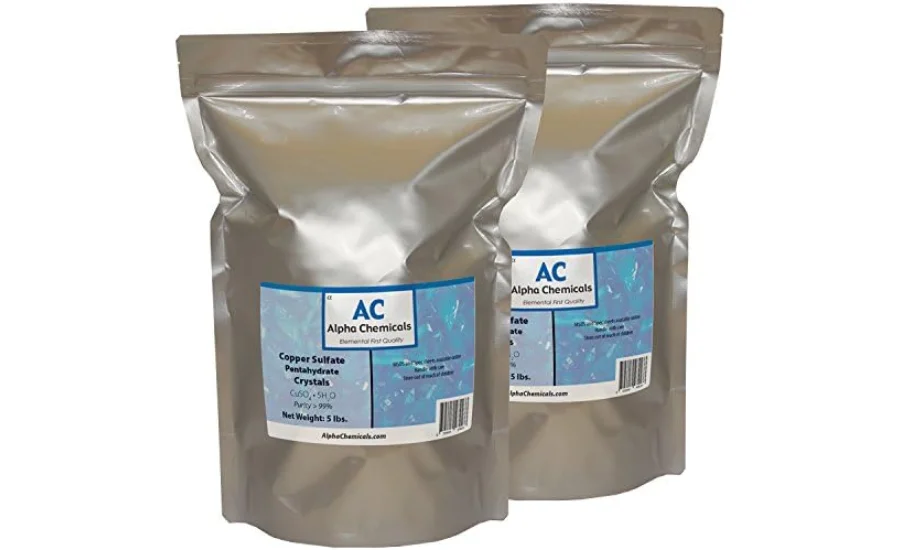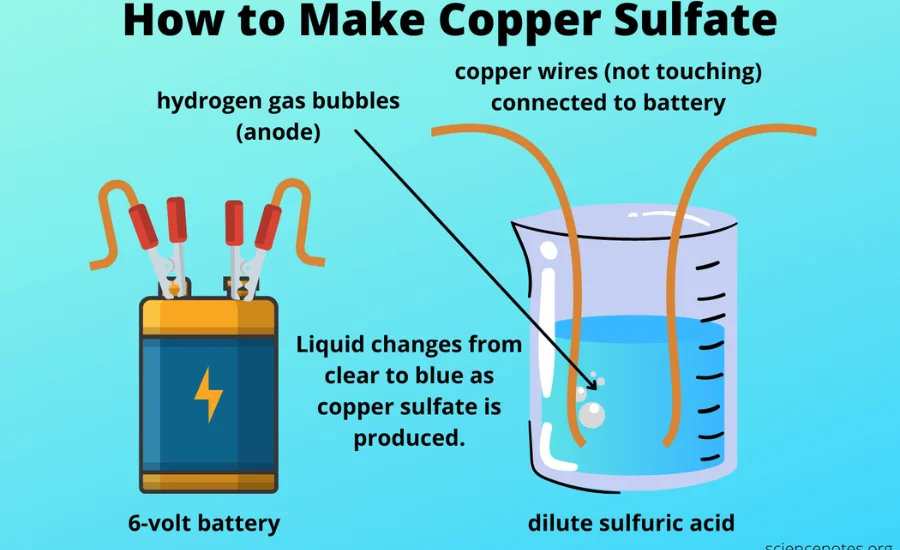Can You Use Copper Sulfate Pentahydrate For Ellmans Condensation:Details Check This
Can You Use Copper Sulfate Pentahydrate For Ellmans Condensation A well-known organic process called Ellman’s condensation is used to create a wide range of chemicals. This reaction usually results in the production of a new carbon-carbon bond when an aldehyde or ketone combines with another molecule. The goal of recent research has been to use different catalysts to optimize this process. Whether copper sulfate pentahydrate, a chemical that is easily accessible, can function as an efficient catalyst for Ellman’s condensation is a relevant question in this context. This paper explores this possibility by analyzing the function of pentahydrate copper sulfate and evaluating its possible effectiveness in promoting this reaction.
Exploring The Role Of Can You Use Copper Sulfate Pentahydrate For Ellmans Condensation

Ellman’s Condensation is a critical chemical process that forms carbon-carbon bonds and is essential to the synthesis of organic compounds, particularly complex molecules. Scientists can create synthetic procedures that are more selective and efficient by comprehending the mechanism underlying this response.
Ellman’s Condensation is significant because it can create vital carbon-carbon bonds, which are necessary for the synthesis of organic molecules. For chemists and chemical engineers working on creating novel materials or medications, this reaction is essential.
Investigating the potential of copper sulfate pentahydrate as a catalyst in Ellman’s Condensation involves a detailed examination of the reaction’s dynamics and how various substances can influence or accelerate this process.
Evaluating Copper Sulfate Pentahydrate as a Catalyst in Can You Use Copper Sulfate Pentahydrate For Ellmans Condensation
A chemical with several uses, copper sulfate pentahydrate is used in environmental science, chemistry, and agriculture, among other disciplines. Because of its distinct chemical makeup, which consists of copper, sulfur, and oxygen, it may be able to catalyze chemical processes like Ellman’s Condensation.
Copper sulfate pentahydrate has a special structure that allows it to interact with other substances, potentially affecting its catalytic efficacy. To ascertain whether or not this molecule is appropriate for Ellman’s Condensation, it is critical to consider how its catalytic properties may impact the efficiency and selectivity of the reaction.
The Role of Copper Sulfate Pentahydrate (CuSO₄·5H₂O) Copper Sulfate Pentahydrate For Ellmans Condensation
Can You Use Copper Sulfate Pentahydrate For Ellmans Condensation represented as CuSO₄·5H₂O, is a blue crystalline solid known for its ability to dissociate into copper and sulfate ions upon dissolving in water. Its unique structure, containing five water molecules per CuSO₄ unit, imparts distinct chemical properties that enhance its functionality in various chemical applications.
Given its reactivity, exploring the use of copper sulfate pentahydrate in Ellman’s Condensation involves understanding how the dissociation of copper ions might act as a catalyst, potentially affecting the formation of carbon-carbon bonds. The pentahydrate form could play a crucial role in stabilizing intermediates or influencing reaction kinetics, offering possibilities for improving reaction efficiency and selectivity.
Evaluating the Role of Copper Sulfate Pentahydrate in Ellman’s Condensation: A Mechanistic Insight
To assess the potential of Copper Sulfate Pentahydrate in facilitating Ellman’s Condensation, it’s essential to delve into the reaction mechanism. This involves a detailed analysis of the step-by-step process through which reactants convert into products.
Usually, nucleophilic addition—in which a nucleophile targets an electrophilic carbon atom and creates new carbon-carbon bonds—is how Ellman’s Condensation works. We can determine whether Copper Sulfate Pentahydrate may affect the efficiency or selectivity of the reaction by looking at this mechanism.
Understanding the intricacies of this mechanism will provide valuable insights into how Copper Sulfate Pentahydrate could enhance or facilitate Ellman’s Condensation, potentially broadening its applications in organic synthesis.
The Role of Copper Sulfate Pentahydrate in Organic Chemistry Reactions
Copper Sulfate Pentahydrate is a versatile reagent and catalyst with a wide range of applications in the field of organic chemistry. This chemical is widely used in certain cross-coupling reactions, oxidation processes, and dehydration reactions.
The copper ion (Cu2⁺) in copper sulfate pentahydrate is primarily responsible for its catalytic efficacy since it facilitates electron transfers and functions as a Lewis acid. As a result, the efficiency of several chemical reactions is increased since the copper ion is able to stabilize reaction intermediates.
Potential Advantages of Using Copper Sulfate Pentahydrate in Ellman’s Condensation
Adding Copper Sulfate Pentahydrate to Ellman’s Condensation may have a number of noteworthy advantages. This chemical may improve the cost-effectiveness, selectivity, and efficiency of the reaction.
Its catalytic capacity, which can speed up the process and produce faster, more effective results, is one of its main advantages. This can be especially helpful in industrial settings where time efficiency and cost containment are critical.
Moreover, Copper Sulfate Pentahydrate may increase the reaction’s selectivity, which could lead to larger yields of the intended product. This improved selectivity can reduce waste and increase process efficiency, making it a useful tool in the arsenal of synthetic chemistry.
The Importance of Ellman’s Condensation in Organic Synthesis

A crucial technique in organic synthesis, Ellman’s Condensation is well known for its ability to yield a wide range of organic molecules. In pharmaceutical chemistry, this reaction is very important since it is crucial to the synthesis of complex compounds needed for medication development.To achieve optimal efficiency, the reaction typically depends on the use of a catalyst. As a result, chemists are continuously exploring innovative and cost-effective catalytic solutions to enhance the process and its applications.
Evaluating Copper Sulfate Pentahydrate as a Catalyst in Organic Synthesis
Due to its extensive availability and low cost, copper sulfate pentahydrate is a desirable choice for a number of organic synthesis applications.However, its effectiveness in Ellman’s condensation may be limited. Compared to specialized copper-based catalysts, copper sulfate pentahydrate generally exhibits lower catalytic efficiency. Furthermore, the specific reaction conditions required for Ellman’s condensation may not be ideal for copper sulfate catalysis, potentially impacting its overall performance in this context.
Can You Use Copper Sulfate Pentahydrate For Ellmans Condensation
Following recognized safety procedures is essential while handling Can You Use Copper Sulfate Pentahydrate For Ellmans Condensation in order to avoid health concerns. The substance may be harmful if swallowed, breathed, or applied topically, where it may irritate skin. Wear the proper personal protective equipment (PPE), such as lab coats, gloves, and safety goggles, at all times to safeguard your safety. You may reduce your chance of exposure and guarantee a secure workplace by taking these actions.
Final Words
Can You Use Copper Sulfate Pentahydrate For Ellmans Condensation has emerged as a significant catalyst in Ellman’s condensation, known for its ability to enhance both the efficiency of the reaction and the yield of the desired products. Understanding its role within the reaction mechanism and optimizing the experimental conditions are key to harnessing its full potential for synthesizing β-dicarbonyl compounds. This guide is designed to offer a thorough and accessible explanation of employing copper sulfate pentahydrate in Ellman’s condensation, providing valuable insights for chemists of all experience levels. Emphasizing careful handling and adherence to safety protocols is essential for achieving successful and safe outcomes in laboratory settings.
For More Information Check This Thrill Rise
